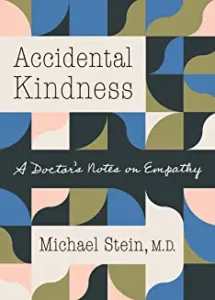Accidental Kindness: A Doctor’s Notes on Empathy by Michael Stein 2022
I really wanted to like this book, but I didn’t. Whether you would like it or not is hard for me to predict because my feelings about it are so colored by my experiences as a physician that my judgement is very much a personal one.
Stein is an internist, a primary care physician most of whose work is done in his office but he is also affiliated with a hospital where the medical staff is undergoing education aimed at addressing the fact that their hospital has placed in the bottom 10% nationwide in patient satisfaction scores. In addition, he is reeling because of errors which he has recently made in communication with several of his long term patients. Stein begins to second guess his training, his practice, his motivation—in short he’s suffering from burn-out, the absence of caring that leads to low patient satisfaction scores and the loss of interest in his chosen profession.
From this starting point, Stein explores the complex question of doctor/patient communication, especially the element of empathy and the physician’s need to toggle between identification with and detachment from the patient’s problems—too much identification leads to emotional trauma and burnout; too much detachment leads to lack of empathy and poor communication and lousy care. Some of the writing is excellent but some is just plain awful. Much too much of the book is spent exploring the aftermath of an operation gone wrong where the patient is left with a paralyzed and deformed face and the surgeon is left distraught and depressed. Another chapter is spent quoting ‘bad doctor’ reports from patients. It all felt disorganized and random to me, and what could have been an important exploration of the doctor/patient relationship fell flat.
I practiced ICU care for nearly 20 years. I no doubt made some mistakes, and a few of those remain vivid all these years later. I was sued, as will more than 80% of physicians in high risk specialties by the age of 55. I went through a difficult trial around the care of a baby who wasn’t even my patient except for during a weekend that I was covering for a colleague. The jury verdict was in my favor, i.e. they determined I had done nothing wrong, which was what I had felt from the beginning. But it was a devastating experience, and I left clinical medicine two years later.
Stein’s book raises important issues about communication between patients and doctors. I’ve always been in awe of the responsibility that society places upon a doctor—to be skilled enough in diagnosis and therapy to relieve suffering and save lives while also being empathetic, communicative, supportive of grief and loss, etc. How does the doctor bring that set of responsibilities which she carries into every patient encounter, an encounter that to the patient is of major import while to the doctor, it’s one more patient appointment or one more case of angina or the 1000th hernia repair? Stein claims that “Kindness, despite the obstacles that may prevent it….is the only way the medical profession will save itself.” I agree with him, but given American society today with the all-mighty dollar and a health care setting that is dominated by private equity and the bottom line, this is a thin reed upon which to rely.
I have a great deal of pride in my profession and a great deal of sadness when one of my colleagues fails because of lack of commitment or an unwillingness to take responsibility. The dollar is the cause of much of the degradation of medicine’s core mission, but each individual must also sort out this distance/identification balance for him/herself. I erred on the side of being over-identified with my patients’ issues which while I believe it made me a better physician, is probably responsible for why I lasted only 20 years. Perhaps with a better balance of identification/distance and without the law suit, I might still be practicing but I doubt it. Tough calls. Credit to Stein for a good try.



